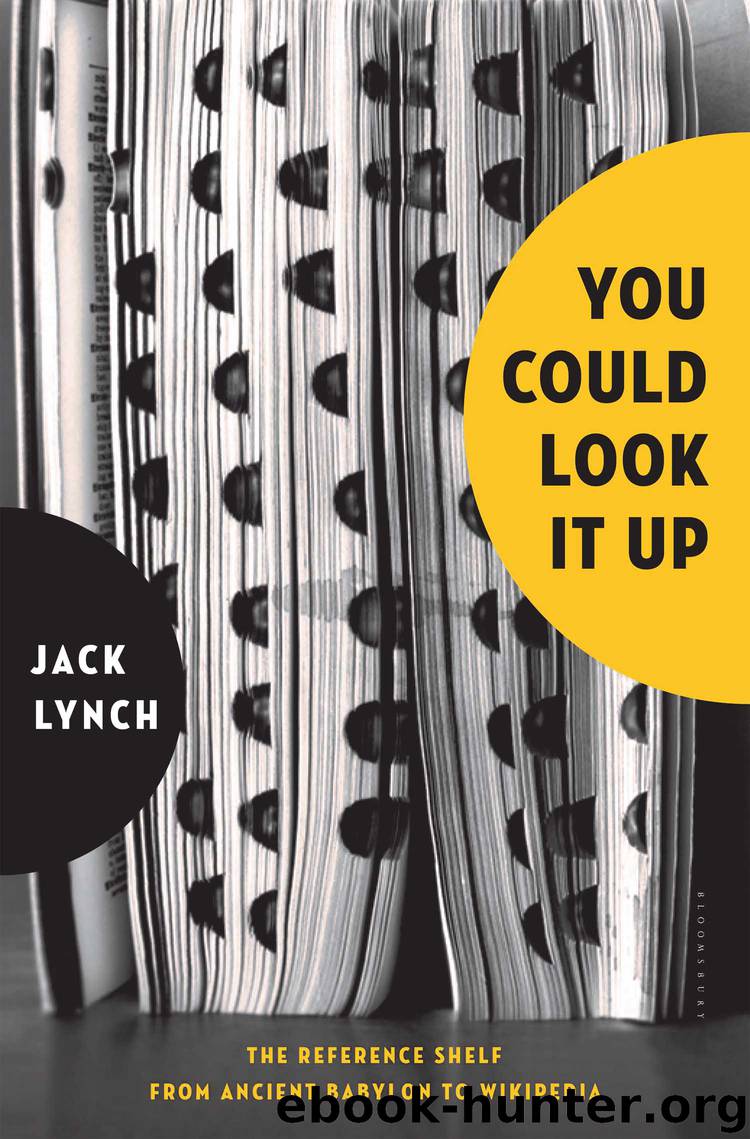You Could Look It Up by Jack Lynch

Author:Jack Lynch [Lynch, Jack]
Language: eng
Format: epub
ISBN: 9780802777942
Publisher: Bloomsbury Publishing
Published: 2015-12-14T16:00:00+00:00
and will miss the printed Encyclopaedia Britannica… . But we live in a complex world, too big for a few hundred people to cover completely, and too fast-moving for print volumes to keep up.4
But most of those who wipe away a tear of regret have to admit this is what progress looks like.
CHAPTER 16
MONUMENTS OF ERUDITION
The Great National Dictionaries
Noah Webster
An American Dictionary of the English Language
1828
Jacob and Wilhelm Grimm
Deutsches Wörterbuch
1852–1971
The French Academy’s Dictionnaire and Johnson’s Dictionary represent different approaches to the idea of a national language: one protected from foreign impurities, based on the “best” literary language, and enforced from on high; the other recognizing the impossibility of ever fixing the language, and concerned only with recording the language as accurately as possible. Dictionaries often reflect the cultures that produce them: since the rise of the modern nation-state in the seventeenth century, lexicographers have worked to reinforce, or even to build, a national consciousness.
Modern maps suggest that everyone in the area labeled SPAIN speaks Spanish; across the border to the west they speak Portuguese; across the border to the north they speak French. But maps can lie. Before the eighteenth century it was hard to tell how many languages were spoken in Spain or Portugal or France, and where the speakers of one left off and the next began. Dictionaries were partly responsible for consolidating national linguistic consciousness. The Della Cruscan Vocabolario, for instance, played a role not merely in recording but in creating the Italian language: it established a standard form of Italian, based on Tuscan, that would displace the dozens of local dialects spoken around the Italian peninsula. When Peter the Great wanted to consolidate a vast and growing Russia, he ordered his Academy of Sciences to regularize the Russian language with an academic dictionary. The six-volume dictionary published between 1789 and 1794 established vernacular Russian rather than Church Slavonic as the standard.1 The Czech National Revival in part of the Austro-Hungarian Empire in the late eighteenth century led to the publication of a pile of reference books, of which Josef Dobrovský’s grammar in 1809 and Josef Jungmann’s Ausfürliches und vollständiges deutsch–böhmisches synonymisch-phraseologisches Wörterbuch of 1834–39—five volumes and 4,700 pages—were the most important.2
The connection between nation and dictionary may be clearest in Poland. By the end of the eighteenth century, the Commonwealth of Poland had come to an end and the country was partitioned among Russia, Austria, and Prussia, prompting Tadeusz Kościuszko to lead an uprising in 1794. It was defeated, but patriotic Poles held on to their sense of themselves as a nation. One passionate advocate for Poland’s cultural identity was Samuel Bogumił Linde, part of the team that composed one of the first written national constitutions, Poland’s so-called “Government Act” of 1788. Linde’s constitution had a short life—the government it established was disbanded after just a year and a half—but his other contribution was more lasting: the Słownik jzyka polskiego, or Dictionary of the Polish Language, published in Warsaw in six volumes between 1807 and 1814.
Download
This site does not store any files on its server. We only index and link to content provided by other sites. Please contact the content providers to delete copyright contents if any and email us, we'll remove relevant links or contents immediately.
Periodization Training for Sports by Tudor Bompa(7328)
The MacArthur Bible Commentary by John MacArthur(4237)
The Body: A Guide for Occupants by Bill Bryson(3801)
The Sports Rules Book by Human Kinetics(3588)
What It Really Takes to Get Into Ivy League and Other Highly Selective Colleges by Hughes Chuck(3221)
Marijuana Grower's Handbook by Ed Rosenthal(3119)
The Sprouting Book by Ann Wigmore(3052)
Salt, Fat, Acid, Heat: Mastering the Elements of Good Cooking by Nosrat Samin(2658)
The Martian by Andy Weir(2610)
Classic by Mary Berry(2501)
The Bread Bible by Rose Levy Beranbaum(2472)
Harry Potter 4 - Harry Potter and The Goblet of Fire by J.K.Rowling(2416)
Sapiens and Homo Deus by Yuval Noah Harari(2414)
The Marketing Plan Handbook: Develop Big-Picture Marketing Plans for Pennies on the Dollar by Robert W. Bly(2414)
Martha Stewart's Baking Handbook by Martha Stewart(2331)
50 Economics Classics by Tom Butler-Bowdon(2066)
Screenplay: The Foundations of Screenwriting by Syd Field(2057)
The Cambridge Grammar Of The English Language by Rodney Huddleston Geoffrey K. Pullum(2046)
The Plant Paradox by Dr. Steven R. Gundry M.D(2039)
